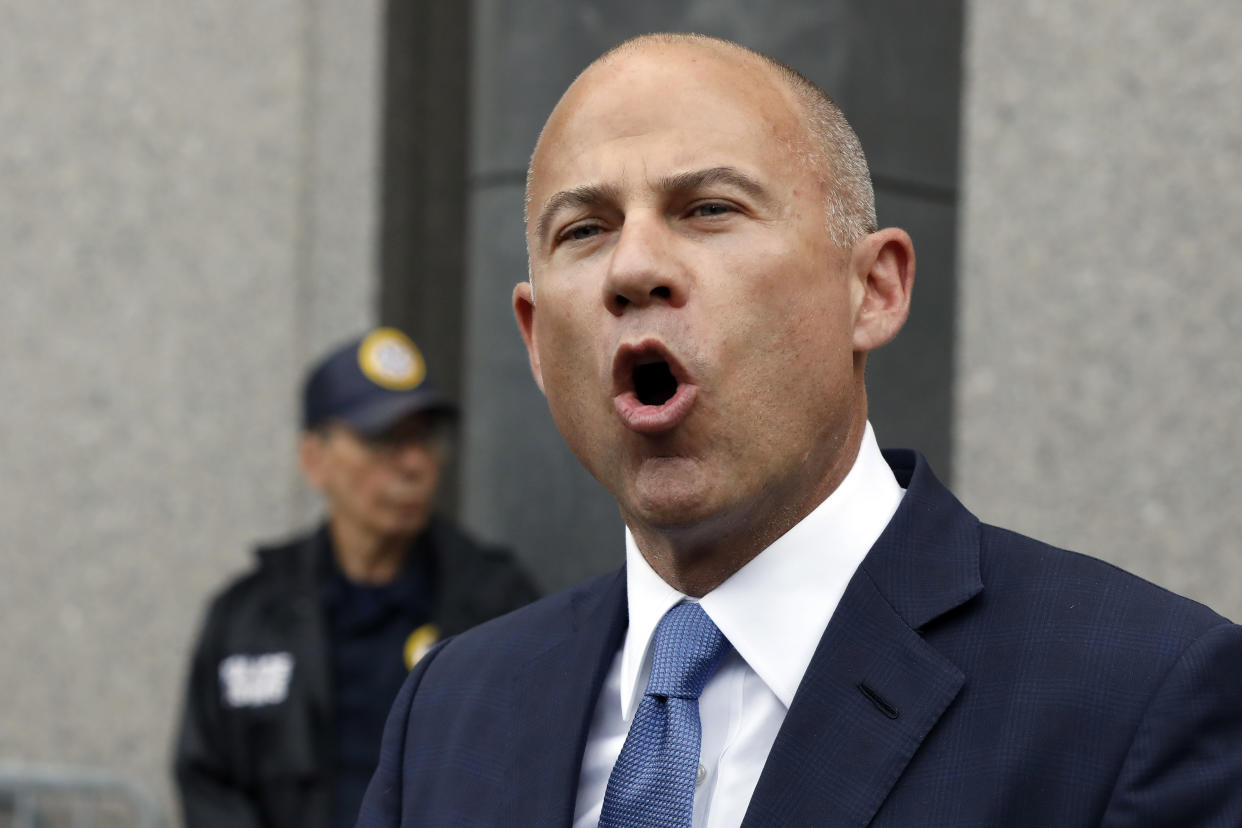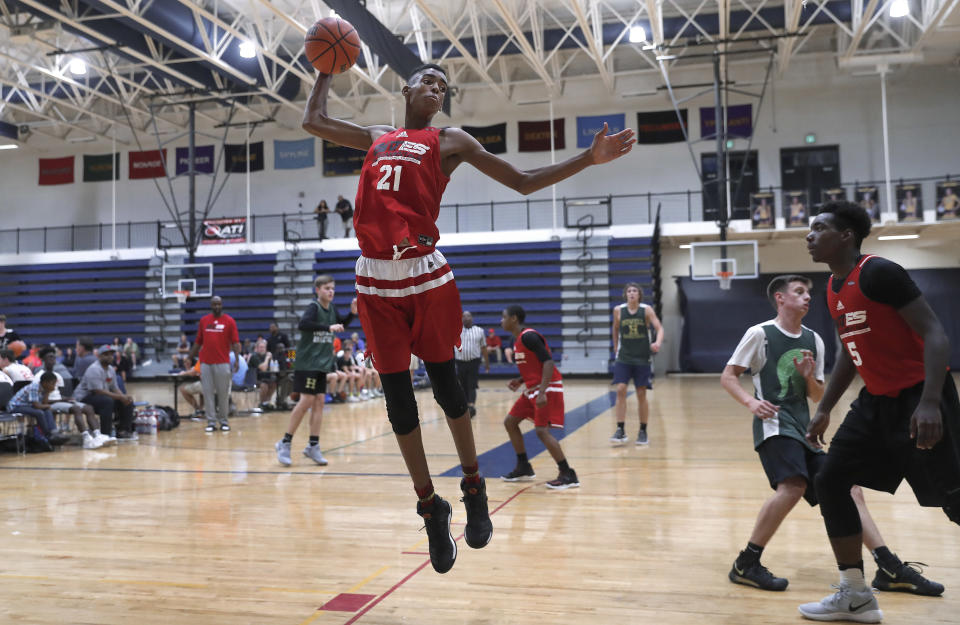Nike texts, emails show shoe company eager to pursue middle school hoops prodigy

The modern reality of amateur basketball — which both the NCAA and federal prosecutors have attempted to “clean up” — is clear in a couple lines of text messages buried deep within some 300 pages of exhibits filed Friday in federal court on behalf of lawyer Michael Avenatti.
Avenatti is charged with extorting Nike. He has pleaded innocent and argued that he was merely representing a whistleblower (a former Nike-sponsored travel coach) in aggressive negotiations. Part of his defense is showing Nike’s alleged behavior and intent in dealing with young basketball players.
Among the supporting documents is a series of text messages from Feb. 11-12, 2017. In them, three Nike executives, Carlton DeBose, John Stovall and Jamal James, from the company’s Elite Youth Basketball League (EYBL), discuss a plan to allocate money to pre-college players, including future NBA draft picks Zion Williamson and Romeo Langford.
They also mention a third player, from Michigan, whose name was redacted from the document because he is a minor. Yahoo Sports learned that player is Emoni Bates, now a 15-year-old rising star of the grassroots basketball circuit.
At the time of the text exchange he was just two weeks past his 13th birthday and attending as a seventh-grader at Clague Middle School in Ann Arbor, Michigan.
That’s how early this starts, and how young a player can draw the attention and dollars from a corporation as large and powerful as Nike that is desperate to have him play in their youth basketball leagues and all-star games. The competition for some promising prospects is underway years before colleges will even put the players' names on a recruiting board.
What was discussed in the text exchange is believed to be a sponsorship deal for an AAU team that Bates’ father, E.J., was running that featured his son. The plan unfolded this way in the documents:
In one text James writes seeking to find out if Nike would be “willing to do … whatever may be needed for the Zion/Romeo situations as well as the money we’re now going to do the [minor] in Michigan.”
Stovall responded:
Langford — 20
Zion — 35 plus
[Minor] — 15
The documents do not show that the offer was ever actually made to any of the three players or their families. Nike declined to comment on any of the specifics from the documents.
E.J. Bates said whatever the Nike executives were texting each other about was irrelevant because the “Bates Fundamentals” team was sponsored by Adidas in 2017. That also means Nike wasn’t the only one interested in a seventh-grader, of course.
NCAA rules allow a shoe company to hire a parent to operate and/or coach an AAU team it funds as long as it is a bona fide employment situation. The onus is on the NCAA to decide if such an employment would be an impermissible benefit and against its rules.
“We didn’t sign with Nike in 2017,” E.J. Bates told Yahoo Sports, in reference to the conversations in the documents that took place in February 2017. “Whatever else is going on, that’s between Nike and Avenatti. Whatever they have going on, that’s between them. To mention my child’s name, it’s not fair to him.”

Bates Fundamentals didn’t join Nike’s EYBL until 2018. Bates, now 15, is about to enter his sophomore year at Ypsilanti (Michigan) Lincoln High School, which he led to a state title as a freshman.
While Bates is certainly a unique case, he underscores the disconnect between clinging to the long-rooted concept of amateurism and the modern reality where the free market clearly dictates players even in middle school can have enormous value to billion-dollar shoe and apparel companies.
There is a good chance Bates never plays college basketball as well. The NBA is expected to change its age minimum in 2022, when he would be a senior, which would allow him to immediately enter the draft.
Still, this is no longer about whether college players should be able to profit off their talent, and it hasn't been for a while. It isn't even about high school players, who by the time they are seniors can attract a massive following on social media among young consumers that companies covet (Williamson had 1.7 million Instagram followers before he enrolled as a freshman at Duke).
It’s early teens and even tweens now, underscored by a separate email that was part of the court filings. In that document, an EYBL coach implores James, the EYBL manager, to have Nike “take some steps to ‘take back’ the middle school market.’ ”
This is not solely a youth basketball phenomenon. Earlier this year, 13-year-old American Olivia Moultrie turned pro in soccer and signed an endorsement deal with Nike. American swimmer Michael Andrew turned pro at age 13, and by 15 had a suit contract with Adidas.
But the truly lucrative market for shoe companies is on the hardwood.
At a young age, the now 6-foot-8 Bates was identified as a prodigious talent. To many grassroots veterans, Bates is as talented as any prospect to come through the American basketball system in the past decade. Some have even compared his potential to LeBron James at the same age.
He has showcased the ability to drive with vigor, shoot with a feathery touch and showcase a general all-around game that hints at limitless potential. His most frequent player comparison is Kevin Durant, which is indicative of the hype that has surrounded his rise.
“He’s the best freshman I’ve ever seen,” Rivals.com recruiting analyst Eric Bossi told Yahoo Sports in May. “I think he’s the best prospect in high school, regardless of class.”
While there is a long road between teen phenom and NBA All-Star, it’s clear that if this was potentially the next big thing then shoe companies were going to flock to him, even if it he was in middle school.
That means money is available, potential bidding wars even. In Bates' case, it’s above board via his father’s AAU program. In other cases, well, the Nike emails and texts — not to mention the court cases in 2018 and '19 that led to prison sentences for Adidas executives — suggest that often is not the way the business works.
Thus far no Nike executives have faced legal issues (as Adidas ones did in a 2018 federal trial that resulted in numerous convictions and plea deals). Thus far no one has lost their job.
One more reminder that it’s a different ball game these days and there may not be anything the NCAA or FBI can do about it.
More from Yahoo Sports:

